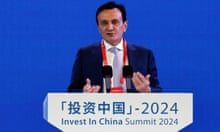When City of London executives were summoned to No 11 Downing Street earlier this month, they were promised reforms that would boost growth, attract talented bankers and usher a new era of prosperity for financial services.
But what the chancellor, Kwasi Kwarteng, failed to mention to bank bosses was that their pay would become a lightning rod for controversy in the mini-budget that followed.
Sources at some of the largest banks in the City admit they were baffled by Kwarteng’s plan to lift the EU-imposed cap on banker bonuses on Friday, a move they had not lobbied for, and do not expect will result in widespread changes to pay packets.
One source at a major UK bank explained that while the budget was “tonally pro-City”, changes to banker bonuses were “not something we were asking for”.
That was despite Kwarteng suggesting the scrapped cap – which has limited payouts to two times bankers’ salaries since 2014 – would spark fresh investment from global banks. He claimed the move would create more higher-paying jobs that could boost tax takings “here in London. Not Paris, not Frankfurt, not New York.”
But even major US lenders – which were among the firms Kwarteng was trying to woo – felt they were on the back foot once the measures were leaked, with one source saying it “came out of the blue”. “I don’t think any banks were truly asking for this,” they said. “They didn’t consult the banks, they just went ahead and did it.”
While the Bank of England is expected to publicly consult on the changes, any overhaul could take years to implement, as banks try to manage their reputations and any potential backlash from investors, or even their own staff.
In the UK, pay committees will have to consider whether reducing salaries in lieu of higher bonuses would lure more talented executives, without risking a return to a bonus culture partly blamed for encouraging short-term thinking and excessive risk in the lead-up to the 2007-08 financial crisis.
They will be looking at comparable pay in countries such as the US, where bosses are not subject to a bonus cap. According to data from S&P Global Market Intelligence, chief executives and chief financial officers at lenders including Goldman Sachs, JPMorgan, and Citigroup took home bonuses ranging from 333% and 575% of their salaries in 2021.
JP Morgan Chase’s boss, Jamie Dimon, for example, was paid a $5m (£4.7m) bonus on top of his regular $1.5m pay.
Back in the UK, Noel Quinn, the chief executive of London-headquartered HSBC, received a $2.2m bonus, equivalent to 129% of his salary. That was higher than rivals at Barclays and Lloyds Banking Group, who were paid bonuses ranging from 45% to 88% of their base pay, according to S&P Global.
However, any pay committees that attempt to overhaul executive pay structures will have to convince investors – including those who manage pensions for millions of struggling UK workers – to publicly support higher bonuses in the middle of a cost of living crisis.
“One would expect investors to be concerned about the incentives to excess risk created by larger bonuses,” said Luke Hildyard, the executive director at the High Pay Centre.
Furthermore, the changes could take time to implement, with pay policies only coming up for renewal every three years. Barclays and Lloyds will be the first to put forward new policies in 2023, while NatWest, HSBC and Standard Chartered are next due to put forward fresh pay plans in 2025.
While there is less public scrutiny for pay cheques outside the boardroom, headhunters said the scrapped cap was unlikely to create more jobs or lure many high-earning bankers to the UK.
US bankers, for example, are unlikely to jump at the opportunity to leave New York hubs for the same pay at a branch in London. Closer to home, European staff who were compensated with higher base pay in exchange for lower bonuses once the cap was introduced in 2014 tend to enjoy the reliability of salary-focused income.
“Nobody likes to have a salary decrease,” an industry source said. “And in a poor year for investment banking, few are likely to clamour to have their contracts ripped up to have a greater proportion of their packet linked to bonuses.”
Some employment lawyers, including Charlie Thompson at the law firm Stewarts, said any attempt to revise contracts could result in a staff backlash. “I can totally envisage some employees being unhappy and alleging breach of contract,” he said.
Banks could attempt to introduce the changes slowly, for example by applying the new pay structures to new employees’ contracts. However, that risks upsetting some workers, who may feel they are at a disadvantage to their co-workers depending on the market performance that year.
Furthermore, banks who shifted staff to continental Europe after Brexit largely did so in order to appease EU regulators, who said it was necessary if they wanted to continue serving clients across the bloc. A comparative change in bonus structures would not be enough to reverse those changes.
In total, banks have announced plans to move 7,000 jobs from the UK to Europe since the referendum, according to the latest EY Brexit tracker released in March.
“In theory, if banks in the City can offer more competitive remuneration packages than, say, those in Paris or Frankfurt, that might attract talent,” Thompson said. “But I would be sceptical and it may not effectively counteract the impact of Brexit on financial services in London.”










